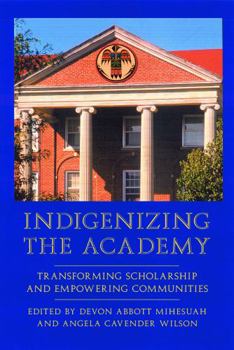Indigenizing the Academy: Transforming Scholarship and Empowering Communities
Select Format
Select Condition 
Book Overview
Continuing the thought-provoking dialogue launched in the acclaimed anthology Natives and Academics: Researching and Writing about American Indians, leading Native scholars from diverse disciplines and communities offer uncompromising assessments of current scholarship on and by Indigenous peoples and the opportunities awaiting them in the Ivory Tower. The issues covered are vital and extensive, including how activism shapes the careers of Native academics; the response of academe and Native scholars to current issues and needs in Indian Country; and the problems of racism, territoriality, and ethnic fraud in academic hiring. The contributors offer innovative approaches to incorporating Indigenous values and perspectives into the research methodologies and interpretive theories of scholarly disciplines such as psychology, political science, archaeology, and history and suggest ways to educate and train Indigenous students. They provide examples of misunderstanding and sometimes hostility from both non-Natives and Natives that threaten or circumscribe the careers of Native scholars in higher education. They also propose ways to effect meaningful change through building networks of support inside and outside the Native academic community. Designed for classroom use, Indigenizing the Academy features a series of probing questions designed to spark student discussion and essay-writing. Devon Abbott Mihesuah is a professor of applied Indigenous studies and history at Northern Arizona University. Her books include Indigenous American Women: Decolonization, Empowerment, Activism and Natives and Academics: Researching and Writing about American Indians, both published by the University of Nebraska Press. Angela Cavender Wilson is an assistant professor of Indigenous history at Arizona State University.
Format:Paperback
Language:English
ISBN:0803282923
ISBN13:9780803282926
Release Date:May 2004
Publisher:Bison
Length:246 Pages
Weight:0.85 lbs.
Dimensions:0.6" x 6.2" x 9.0"
Customer Reviews
1 rating
Natives in Academia
Published by Thriftbooks.com User , 20 years ago
In recent decades, American historians have significantly re-evaluated the role of Native Americans in the continent's history. Largely, of course, this was done by academics who were not themselves of that ethnicity. A roundabout way of saying that most were white, and male, for that matter.But there has also been an increasing number of Natives ascending the academic ladder. First as students, and then as faculty. A decades-long process. It has produced enough people, thus far, to enable the editors to put together this book. Here, the emphasis is not so much on changing a typical view of Natives in history, but instead on the academic environment itself, and how it impacts Natives trying to fit in. Which can be very difficult, as some articles in the book attest. A typical Native student might not have a family tradition of reaching college as a student, let alone as an academic.The editors have amassed very articulate concerns. Quite readable.






